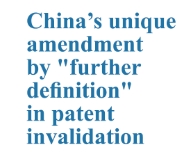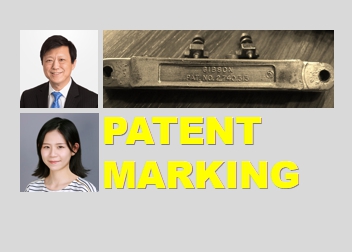-
New
- Application of Unitary Patent Court (UPC) decisions in Contracting States
-
This article will discuss the principles relating to the interaction between the UPC and national courts when enforcing UPC decisions and orders, as well as the as yet undefined aspects of these applications.
-
New
- Interpretation of Relevant Regulations about the UPC Patent Mediation and Arbitration Centre
-
Article 35, paragraph 1 of the Unified Patent Court Agreement (“UPCA”) provides for the creation of a patent mediation and arbitration centre (Centre) seated in Ljubljana and Lisbon.
-
New
- China’s institutional reforms and what it means for resolving IP disputes
-
Following the launch of the plan, the 14th National People’s Congress of China passed the institutional reform of the State Council. The functions of CNIPA and the SAMR are now coordinated, and the enforcement teams of SAMR maintain the duty to enforce the law for trademarks and patents, under the professional guidance of the CNIPA. But what does this reform mean for dispute resolution, particularly arbitration, in resolving disputes around IP?
-
New
- EU’s proposal for a more efficient and future-proof design law
-
On 29 November 2022, the European Commission published its long-awaited proposals for a new Directive on the legal protection of designs (hereafter “DDir”) and a new Regulation on Community designs (hereafter “DReg”). The Directive is the instrument used to provide harmonization amongst EU Member States with regard to their national design laws.
-
New
- Chinese character trademarks enjoy lowered distinctiveness in EU
-
The recent judgement of the General Court of the European Union in Case T‑323/21 Castel Frères v. Shanghai Panati Co. deals with the genuine use of a trade mark and distinctiveness of Chinese character trade marks in the EU. The Court decided that the registration of the contested Chinese character trade mark shall be revoked because its level of distinctiveness is below the average and it had been only used as a decorative element and not as an indication of origin of the goods.
-
New
- Patent eligibility of software inventions
-
Article 25 of the Patent Law provides for six types of subject matters for which no patent right should be granted. No matter how practical, novel or inventive they are, specific results covered by such subject matters are excluded from patent protection. Nevertheless, the determination of ineligible subject matters does not require evidence to aid comparison as in the case of commenting on novelty or inventiveness, which can be concluded directly and merely by deductive reasoning.
-
New
- China's unique amendment by "furthuer definition" in patent invalidation
-
From the perspective of the legislative purpose, the purposes of formulating the patent law are the same in all countries in the world, and with the continuous development of globalization and deepening international cooperation, international patent procedures such as the Paris Convention for the Protection of Industrial Property and the Patent Cooperation Treaty (PCT) have emerged accordingly. However, there still exist subtle differences in many provisions of the patent law of each country depending on their actual situations.
-
New
- Applicable circumstances for postponement of examinations of administrative trademark cases
-
This article mainly introduces and discusses the specific types of cases that can be postponed in trademark administrative cases and the circumstances of the application of postponement. In the above-mentioned procedures and other procedures, there are also some other causes for postponement, such as requesting for the postponement of examination of review cases of refusal based on a consent.
-
New
- Ownership of trademark rights of informal appellations
-
The analysis of this paper shows that there are two main factors that affect the ownership of trademark rights of informal appellation: one is whether the holder of formal trademark has subjective intention and objective behavior to use informal appellation, and the other is whether the use of informal appellation by others will lead to confusion and misunderstanding or damage the legitimate rights and interests of the holder of formal trademark.
-
New
- Is Patent Marking the Patent Owner’s Right or Statutory Duty?
-
Patent marking statutes in the U.S. and China take completely different stances. In the U.S., patent marking requires an affirmative act of the patentee to mark her products, and failure to comply with patent marking may drastically limit the past damages afforded to the patentee before a litigation on patent infringement had begun. In contrast, patent marking in China only gives the patentee the right, rather than the obligation to mark, whereas the patentee may be entitled to a fully recovery of past damages regardless of whether or not she has done patent marking.













